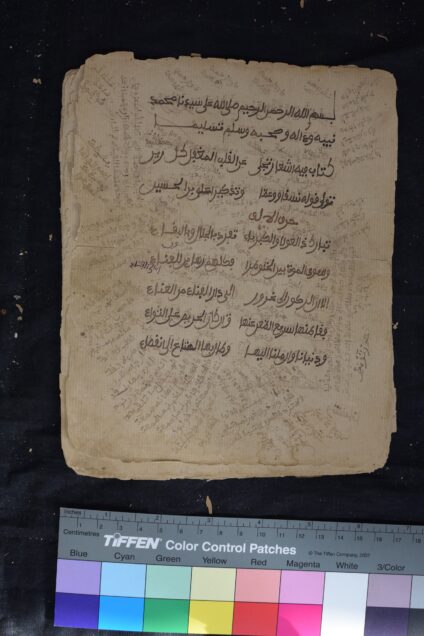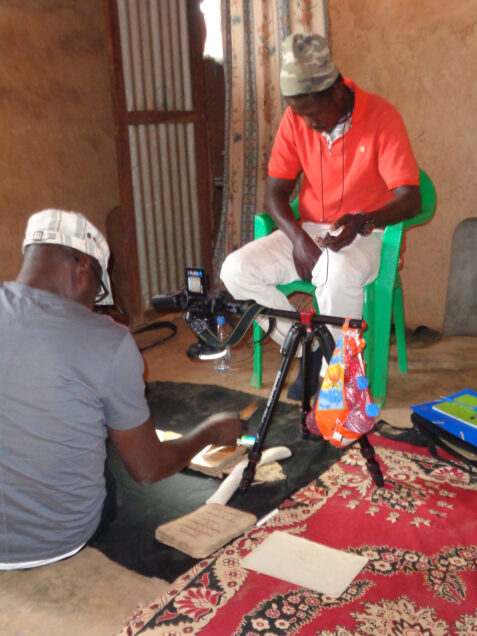Boston University Libraries Uploaded the World’s Largest Digital Collection by Mande Scholars
By Eleni Castro, Fallou Ngom, Daivi Rodima-Taylor
Boston University scholars and digital collections experts recently completed uploading the largest to date digital collection of Mande scholars’ work in the world. The project EAP 1042, funded by the British Library/ARCADIA focused on the archives of Mandinka scholars of Casamance, Senegal. The BU team digitized over 18,000 pages of Arabic, Arabic-Ajami bilingual texts, and Mandinka Ajami manuscripts covering a variety of religious and non-religious subjects. These materials will help scholars and students of Africa for generations to come enhance their research and teaching on various aspects of pre-colonial, colonial, and post-colonial Africa.
The Ajami texts of the Mandinka people of Casamance in southern Senegal are not well known beyond local communities. Many of these sources are written in Mandinka Ajami, the enriched form of the Arabic script used to write the Mandinka language for centuries. Among the least documented, only a few Mande Ajami manuscripts (including languages such as Bamanankan, Eastern Maninka, Western Mandinka, Jakhanke, Jula, and Susu) are available to scholars. The recent EAP 1042 project funded by the British Library’s Endangered Archives Programme has changed this, identifying and digitally preserving over 18,000 pages of Mandinka Ajami and Arabic texts from the Casamance region of Senegal. The Endangered Archives Programme provided digitization/curation guidance and funded this digital preservation project, which is supported by Arcadia, a charitable trust of Lisbet Rausing and Peter Baldwin and administered by the British Library.
The project involved an international research collaboration between Boston University, the West African Research Center, and local experts in Senegal. Several of the team members had extensive expertise in digital preservation of endangered manuscripts – for example, Professor Fallou Ngom led the initiative of digital preservation of Wolof Ajami manuscripts in Senegal in 2011, which resulted in the creation of the African Ajami Library at Boston University. Eleni Castro, OpenBU & ETD Program Librarian at Boston University Libraries, served as the Mandinka project’s technical lead and conducted training in best practices in digital preservation of manuscripts to the fieldwork team. Other participants in the project included scholars from Senegal, as well as local knowledge experts and distinguished elders.
One of the distinguishing characteristics of the project was its significant fieldwork component of working with manuscript owners and language experts in the local communities of Southern Senegal. Following a three-day digital preservation workshop at the West African Research Center (WARC) in Dakar in January 2018, the team spent 15 months interviewing manuscript owners and digitizing rare manuscripts from Ziguinchor, Kolda, and Sédhiou, and curating and post-processing over 18,000 digital images. Three independent copies were deposited at WARC in Dakar, the British Library, and Boston University’s African Ajami Library on OpenBU.

The manuscripts, often kept in trunks in the households of the local scholars or their descendants, covered a broad range of topics – including jurisprudence, divination and astrology, religious poetry and prose, secular records of commerce, local genealogies and biographies, folkloristic treatises of traditional medicine, customs and rites, accounts of social institutions and local cosmologies. Containing a wealth of knowledge about local livelihoods, customs and mores, several texts constituted more than static repositories – functioning as ‘living documents’ with their marginalia of opinions and insights that were continuously added as the texts journeyed among the community members. A significant part of the manuscripts consisted of poetry designed to be performed and recited in the local communities – serving as an efficient tool of education and socialization. The themes dealt with issues of politics, morality and ethics, family and community relations and norms, shared history and experience of war and peace.
Working in remote areas of rural Africa with limited access to power and adequate lighting also created certain technical challenges, prompting the team to find innovative ad-hoc solutions. In order to not burden the local households of manuscript owners, the team had to work with available light and the help of a macro ring flash. They found that replacing a hot camera battery with a cooler one after a period of work helped to resume digitization much faster. Locally available channels of communication, such as WhatsApp, were used to coordinate activities between the geographically dispersed team members. Fieldwork data were regularly uploaded on Google Drive, speeding up internet access with the help of a mobile hotspot modem.

All of these materials are now publicly available in the African Ajami Library (AAL) on OpenBU and will soon be available on the British Library Endangered Archives Programme website. All of the digitization equipment and a copy of the digital archive will remain with the local partner, West African Research Center in Dakar, in order to support its digitization projects and make accessible the materials to researchers in the region. However, there is still more work to be done to help researchers more effectively discover, explore, and study these materials. The digital team will be looking into using an IIIF image viewer for scholars to more easily be able to view, compare, and annotate manuscripts. Since not all West African languages currently have their Ajami letters assigned Unicode characters, transcription is a long‐term goal to help make these materials more accessible. Another ongoing effort—from a social and cultural perspective—is sustaining and building enduring relationships with the manuscript owners and communities where the materials originated from.